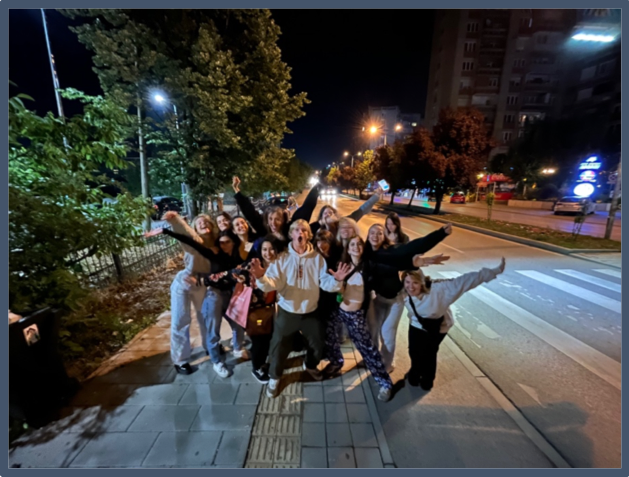17 June 2022*
On the
morning of the 17th meeting up at Newborn already felt familiar. And before we knew it, with the
obligatory coffee in one hand and delicious Kosovar pastries in the other, we
were already on our way to our first meeting of the day with EULex. The
European Rule of Law Mission was established after Kosovo declared independence
in 2008, and since then it has been acting as a second-responder institution,
claiming to provide support to local legal institutions in both legislative and
executive matters, based on the European legal framework and norms. During the
meeting, former news anchor and current EULex spokesperson Donika Berisha took
us through the history of the institution, its development, and its current
role in Kosovo. In this context, Berisha highlighted, in particular, EULex's
correctional units, which deal with the reintegration and resocialization of
prisoners, its Forensic Institute, which supports the search for missing
persons, and its campaigns against the major problem of gender-based violence
in Kosovo; this is an issue that would occupy us also in the next meeting. Afterwards,
we were able to answer some questions that, in the spirit of our critical
thinking mandate throughout our studies at AUC, mainly concerned hurdles and problems faced by the
organization. These included expectation management towards EULex, as well as
cooperation with security forces in the Serbian enclaves such as North
Mitrovica. Despite the pervasive institutional and bureaucratic atmosphere of
the place, it was an essential piece of the puzzle that allowed us to
understand the complex nature of the far from uncontroversial international
presence in Kosovo.
One group photo later and after we had passed through security yet again, we left the iron gates of EUlex behind us and headed for lunch at a cozy book café called Kadare, where people started to work on their group projects, recapitulated the impressions of the previous meeting, and enjoyed their short break. We also were able to have a chat with the owner of the café, one of many insightful interactions that we would have throughout our stay with Kosovo locals, allowing us to get a more comprehensive understanding of the concerns of this young country and its young population. He told us about the lack of perspectives for young Kosovars for their future and how, in his eyes, this has caused those not leaving Kosovo for western Europe or America to fall into a state of fatigue and paralyzing frustration.
At around 2:00 p.m., it was time for our next meeting with the Kosovo Women's Network and two of its members, Besarta Breznica and Adelina Berisha. This turned out to be one of the most remarkable meetings of our trip for many of us. KWN is a non-governmental organization that grew out of an unofficial network of women's rights groups established in 1996, before becoming official in 2003. It currently represents over 190 Kosovar women's organizations and does so "[...] regardless of political beliefs, religion, age, educational level, and sexual orientation." The network thus facilitates collaboration, knowledge sharing, and advocacy at the local, regional, and international levels. Moreover, it has become all the more essential to the Kosovar women's rights movement because of its numerous research and empirical studies.
Moreover, KWN has become one of the most important lobbying and advisory forces for the government when it comes to integrating a gender perspective into the Kosovar legal framework in line with the Istanbul Convention. But its influence does not stop there. KWN also represents the voices of other minority groups such as the Roma, Ashkali, and Egyptian communities, as well as the LGBTQI+ community, and plays a crucial role in establishing shelters for victims of gender-based domestic violence and more. Because of its wide range of missions and expertise, the network has gained an established reputation in Kosovo, which left me fascinated and wondering what KWN has yet to engage in. All in all, it was an impressive meeting that once again made clear that even in a widely considered patriarchal society like Kosovo, feminism is by no means a Western Europe panacea, but an organic and local phenomenon that was present in Kosovo long before the 1999 war and the subsequent intervention of international forces.
We ended the day with dinner together at Pristina's beautiful Germia Park, which gave us a brief respite before heading out to explore the city's vibrant nightlife.
*Please note that the blogposts are not appearing in chronological order of the days of the trip.





No comments:
Post a Comment